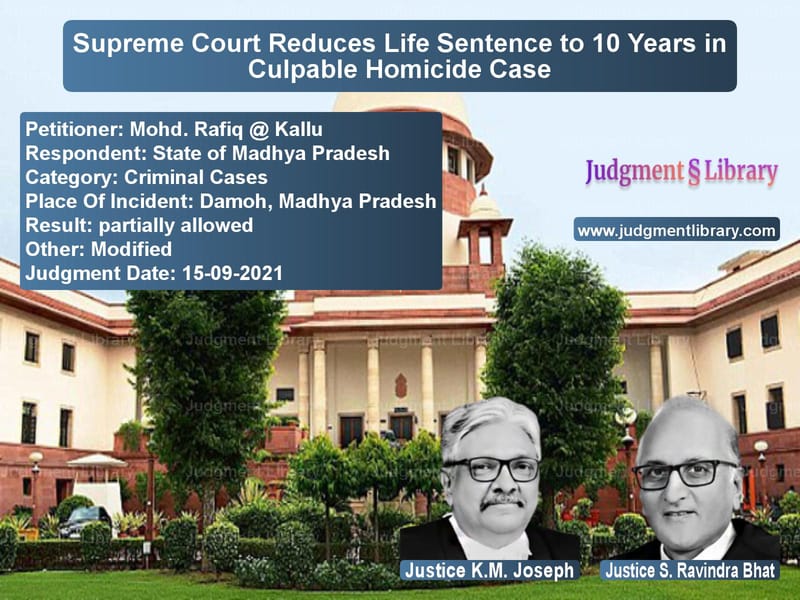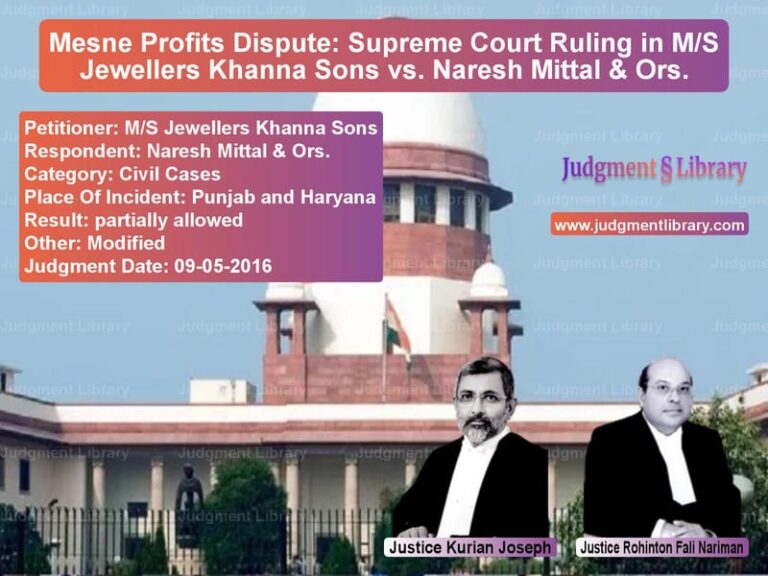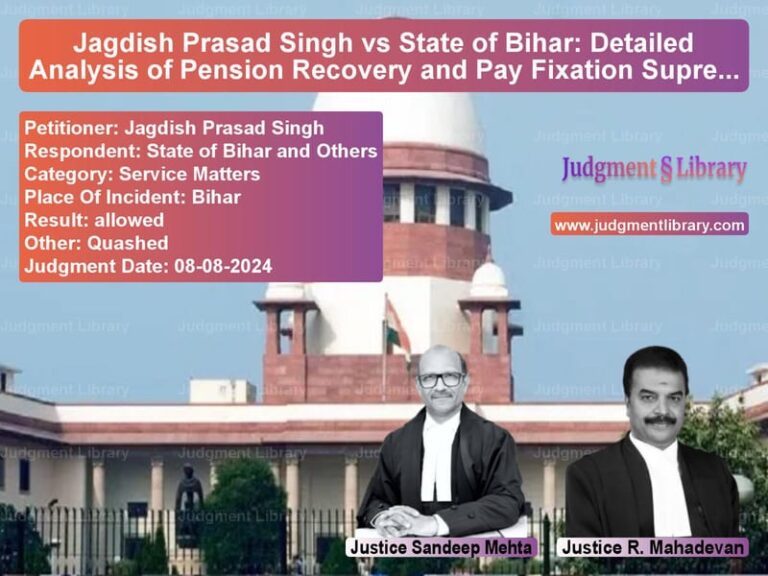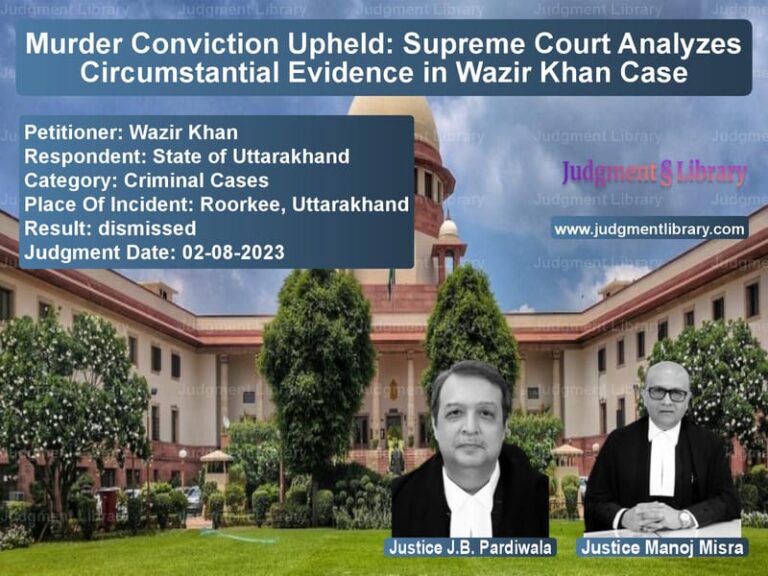Supreme Court Reduces Life Sentence to 10 Years in Culpable Homicide Case
The Supreme Court of India recently modified the conviction of Mohd. Rafiq @ Kallu, who was earlier sentenced to life imprisonment for murder under Section 302 IPC. The Court ruled that the accused should be convicted under Section 304 Part I IPC instead, reducing his sentence to 10 years rigorous imprisonment. The judgment clarifies the distinction between murder and culpable homicide not amounting to murder.
Background of the Case
The case dates back to March 9, 1992, when a truck (bearing registration number CPQ 4115) broke through a Forest Department barrier and subsequently collided with a motorcycle. The police, alerted about the incident, set up a checkpoint to stop the truck. Sub Inspector (SI) D.K. Tiwari motioned for the truck to stop, but the accused, Mohd. Rafiq @ Kallu, continued driving. SI Tiwari attempted to board the truck from the left side, at which point the accused allegedly pushed him off. The SI fell to the ground and was run over by the rear wheels of the truck, resulting in his death.
Following the incident, the accused was arrested and charged with murder under Section 302 IPC. The case was tried in the Sessions Court, Damoh, and the conviction was upheld by the Madhya Pradesh High Court before reaching the Supreme Court on appeal.
Trial Court’s Judgment
The Trial Court convicted the accused under:
- Section 302 IPC – Life imprisonment for murder.
- Fine imposed with a default sentence of three months simple imprisonment.
The conviction was based on eyewitness accounts, medical evidence, and forensic reports.
High Court’s Judgment
Mohd. Rafiq @ Kallu appealed against his conviction, but the Madhya Pradesh High Court upheld the Trial Court’s verdict, ruling that the prosecution had successfully established the intention to kill.
Arguments by the Petitioner (Mohd. Rafiq @ Kallu)
- The appellant argued that there was no intention to kill SI Tiwari and that his actions were a result of panic.
- The defense pointed out contradictions in the statements of eyewitnesses, particularly regarding the sequence of events.
- It was argued that the accused did not have prior knowledge that SI Tiwari was a police officer, as he was in plain clothes.
- The appellant contended that his action of pushing the officer was instinctive resistance rather than a deliberate act of murder.
Arguments by the Respondent (State of Madhya Pradesh)
- The prosecution maintained that the accused had deliberately pushed the officer, causing him to fall in the path of the rear wheels.
- It was emphasized that the accused had verbally threatened the deceased before the act.
- The state argued that the accused’s actions were not accidental but rather indicative of an intent to harm.
Supreme Court’s Key Observations
- The Supreme Court ruled that there was no conclusive evidence proving that the accused intended to kill SI Tiwari.
- The Court noted inconsistencies in the statements of prosecution witnesses, particularly regarding the source of light and the manner in which the officer was pushed.
- It held that the act of pushing the officer off the truck, while reckless, did not necessarily constitute murder.
- The Court referred to legal precedents distinguishing between culpable homicide and murder, concluding that this case fell under Section 304 Part I IPC.
Final Verdict
The Supreme Court modified the conviction as follows:
- Conviction altered from Section 302 IPC to Section 304 Part I IPC (Culpable Homicide not amounting to Murder).
- Life imprisonment reduced to 10 years rigorous imprisonment.
- Fine imposed by the lower courts remains unchanged.
Implications of the Judgment
The ruling has significant implications for criminal law:
- Clarification on Culpable Homicide: The judgment reaffirms that cases where intent to kill is not clearly established should be treated under Section 304 IPC.
- Judicial Approach to Intent: The ruling highlights the importance of considering intent separately from the outcome of the act.
- Impact on Similar Cases: This decision serves as a precedent for cases where a fatal incident occurs without clear evidence of premeditated murder.
Analysis of Murder vs. Culpable Homicide
Under the IPC, there is a fine distinction between murder (Section 302 IPC) and culpable homicide not amounting to murder (Section 304 IPC). The Supreme Court noted that:
- Murder requires a clear intention to cause death or bodily injury sufficient to cause death.
- Culpable Homicide applies when death is caused due to a reckless act without a direct intent to kill.
- In this case, the accused’s actions, while reckless, did not establish an absolute intent to kill.
Impact on Future Criminal Cases
This ruling will influence future cases involving allegations of homicide, as it reinforces the need to prove intent before convicting under Section 302 IPC. Key takeaways for the legal community include:
- Courts must carefully evaluate the presence of intent in homicide cases.
- Eyewitness testimony should be scrutinized for consistency and reliability.
- The ruling encourages defense lawyers to challenge overreach by the prosecution in homicide cases.
Conclusion
The Supreme Court’s decision in Mohd. Rafiq @ Kallu vs. State of Madhya Pradesh provides clarity on the distinction between murder and culpable homicide. By reducing the life sentence to 10 years, the Court ensured that the punishment was proportionate to the accused’s actions. This judgment serves as a guiding precedent for future cases involving reckless but unintentional acts leading to death.
Petitioner Name: Mohd. Rafiq @ Kallu.Respondent Name: State of Madhya Pradesh.Judgment By: Justice K.M. Joseph, Justice S. Ravindra Bhat.Place Of Incident: Damoh, Madhya Pradesh.Judgment Date: 15-09-2021.
Don’t miss out on the full details! Download the complete judgment in PDF format below and gain valuable insights instantly!
Download Judgment: mohd.-rafiq-@-kallu-vs-state-of-madhya-prad-supreme-court-of-india-judgment-dated-15-09-2021.pdf
Directly Download Judgment: Directly download this Judgment
See all petitions in Attempt to Murder Cases
See all petitions in Custodial Deaths and Police Misconduct
See all petitions in Judgment by K.M. Joseph
See all petitions in Judgment by S Ravindra Bhat
See all petitions in partially allowed
See all petitions in Modified
See all petitions in supreme court of India judgments September 2021
See all petitions in 2021 judgments
See all posts in Criminal Cases Category
See all allowed petitions in Criminal Cases Category
See all Dismissed petitions in Criminal Cases Category
See all partially allowed petitions in Criminal Cases Category







